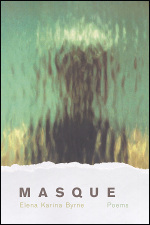 |
Comment on this
article

Masque
by Elena Karina Byrne
61 poems/ 86 pages
Price: $16.95
Tupelo Press
http://www.tupelopress.org/books/masque
Reviewed by: Ed Bennett
Masks have been with humanity since the early times when our minds sought answers and we found them in communal religious rituals. The wearer is transformed to another entity – a god, a creature, a legendary character. They are pervasive, found in societies both primitive and advanced, having a place in these societies varying from religious totem to a child’s Halloween party. The Roman word for mask is “persona”. Ancient theatrical productions frequently used masks to augment a character or, simply, to allow a single actor to cross genders or play several parts in the same play. In the 1500, a Masque was also a performance done in costume replete with traditional masks.
With the advent of psychology, both Freud and Jung spoke of personality and the masks that a person uses to either hide or demonstrate character traits. They used the old term, persona, to define these mental masks within us. Both saw these “personas” In terms of the old Italian theatrical definition. An actor wore a mask and his character spoke the lines “per sonare” or “spoken through” the mask that they wore. Freud walked the path of the unconscious to define his psychology while Jung saw something deeper, something totemic in the collective consciousness of society. In our sophisticated 21st Century sensibility we see masks as a plaything, an accessory to Mardi Gras, not realizing that this spectacle is rooted in our religious practices. Despite the beads and parades, we are closer to our aboriginal forbears than we probably care to admit.
Elena Karina Byrne’s collection of poems “Masque” boldly steps into this topic by defining our social interactions in terms of the masks that surround us. Some are worn by people, as in “Anais Mask” and “Her Salt Mask” while others are stand-ins for our own beliefs, like “Manifest Destiny Mask: Flying”. Each of the poems is headed by a statement from figures that range from Horace to Pablo Neruda to Einstein. These headings focus the reader into the depth of each poem where images are constructed to create the illusion called out by each mask.
In “Mirror’s Mask” we are told:
“ I am always awake, alive in refraction, the narrative
switchblade shining….
You look good from here, looking
me in the eye, receiving.
I have saved your image,
bitten-back by context, disenchanting
and necessary. I will never die nor
pick you out of a crowd. Second sight”
What is particularly interesting in this poem is that the header is a quote from Umberto Eco’s “Kant and the Platypus”, a series of essays on cognition. The semiotics of the interplay between lovers itself mirrors Eco’s discourse on mirroring. Prof. Eco would have cast a wry smile at this, no doubt.
There is a deep sensuality in these poems, sometimes apparent, sometimes below the surface in an almost Freudian current. “Master and Servant: Mask” is a soliloquy from a submissive lover showing the inverted world of their love where it is the submissive demanding from their Dominant:
“Wake me. Tell me what to do with myself in the dark.
Our life is made of words. The world obeys
no apology here.
I demand your full attention
and a tied locket of your hair.
Your being, my nothing.”
Reading these poems is like walking through a museum’s collection of masks from different cultures. Each poem, like the masks on the wall, is distinct and uniquely shaped to fit its function. From time to time we stop, captured by the beauty or the terror depicted, realizing that it has grabbed us somewhere deep and very personal. Jung would say that there was a collective consciousness that we share through our totems, and that would be a definition of the mask on the museum wall. In the case of these poems, their uniqueness may pull us toward the nub of the poem’s meaning but this is due more to Elena Byrne’s craft than our psyche. One comes away from reading these poems with the impression that the poet has looked deep within our soul and she has seen beyond our own mask, however potent we feel that it may be.
Ms. Byrne has appended several pages of notes to the collection where she gives the influence on several of the poems in the collection. While they do clarify the poems somewhat, they have the effect of drawing the reader back to the poem to re-read it and perhaps gain a deeper insight. I’m not sure of the necessity of this appendix primarily because the rich imagery of each of the poems is enough to demand a second or third reading in itself.
A good poem will move a reader. A great poem will also disturb a reader and cause one to re-examine the subject of the poem from a different aspect. Elena Karina Byrne’s “Masque”, as its name implies, is a master performance. The poems surround one with complex images that are cast against the reader’s psyche like a Jackson Pollock painting. There is color, there is structure, there is every tool that a poet uses to create a scene but the scenes are drawn from our minds and emotions as well. Ms. Byrne has sustained the conceit of speaking through this series of masks and has done it brilliantly with a pitch perfect poetic voice an engaging language that is both accessible yet complex. I have never described a collection of poetry as a “page turner” but this collection deserves that title.
Return to:
|


